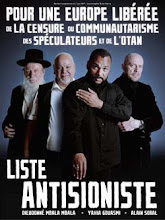The Country You Save May Be Your Own.
Despite saying No, Irish are not alone
Sunday July 06 2008
THE FICTION that the other 26 countries of the EU watched in dismay as Ireland rejected the Lisbon treaty is just that -- a piece of fiction.
The UK voters would have done much the same, only more so, had they been given the chance. It was because the Blair government was saved by the French and Dutch referenda on the EU constitution that they were able to wriggle out of their election manifesto to have a referendum, claiming speciously that the Lisbon treaty was a mere tidying-up exercise and nothing like the Constitution. Everybody from the EU Constitution's creator, Valery Giscard d'Estaing, downwards knows that this is arrant nonsense.
So the failure to bring the revised "constitution" into being can this time be lain at the Irish door. For a second time the Brits have had a let-off.
Or have they? There is a growing feeling in continental Europe that the ungrateful Irish should be told, as they were after Nice, that they had better think again or be condemned to the slow lane in a two-speed Europe.
The bullying will start in earnest in the autumn. Irish ministers have inevitably pronounced the mantra "the people have spoken", but they will be told that that is no excuse.
The package to be put to the Irish voters in say, a year's time, can already be discerned. First, some deal will be done to save the Irish commissioner.
Most UK voters are mystified as to why the Irish care so much about retaining "their" commissioner. (In theory, all EU commissioners pledge themselves to operate as Europeans, not nationals of a member state; in practice they tend to regard themselves as extensions or outposts of their national Embassy.) But as I heard many times when I was UK Ambassador in Dublin, the big countries have other ways of exercising their power and influence in the EU. The smalls rely on the Commission and their national commissioner in particular.
Retaining the national commissioner for every nation state is of course not sensible for the efficient working of the Commission, which is already overblown -- and what happens when the next enlargement takes place? But it can probably be handled as a "temporary" derogation from the Lisbon treaty to avoid everyone being asked to vote on the revised treaty again.
Then we shall probably see a series of protocols which will spell out what the Lisbon treaty is not about. No conscription, no mandatory euthanasia, gay marriages or abortion, no tax harmonisation, no dilution of Irish identity, no abandonment of the Irish veto on World Trade talks, no to all the other porkies which the No side so effectively peddled and which the Yes side were so abysmal at countering -- and very slow out of the traps into the bargain.
It cannot, incidentally, have been helpful that some of the key protagonists on the Yes side -- like the Taoiseach and the Irish EU Commissioner -- confessed not to have read the document fully. It takes some chutzpah to expect the voters to vote for a document you can't be bothered to read yourself. Charlie McCreevy's comment that he hadn't read it completely and "would not expect any sane person to do so" may have been endearingly honest and typically forthright. But was it politically wise?
I don't think so. A view supported by the Eurobarometer poll on why people voted No. The predominant reason by far was unfamiliarity with the treaty. "How can I vote for something I'm not familiar with?"
So the conclusion some are tempted to come to -- that the Irish are an ungrateful lot who, having pocketed around €50bn in EU grants in recent years, are now unhappy at becoming net contributors and have fallen out of love with Europe -- is a complete misreading. The Irish may be nostalgic for the EU as it was, "the way we were", but they have always shown generosity to those in need.
The No vote was largely down to a failure to have the Lisbon treaty properly explained and the myths debunked. The Nos have always enjoyed a core vote of around 20 per cent of the electorate who generally turn out, so, unless there is a pretty high participation rate, they are likely to garner a high percentage of the vote.
How realistic is it to expect Irish politicians to put the Lisbon treaty back to the people with a few knobs on it to make clear that Irish neutrality is inviolate etc? Certainly they will come under enormous pressure from France, Germany and the Commission, but if they choose to resist they may find allies just across the Irish Sea.
The British, like the Irish, are resolutely opposed to the whole idea of a two-speed Europe -- though they are often erroneously attracted to an equally pernicious idea: that of a directory of the three bigs, UK, France and Germany, to act as the new motor of Europe. Not only does this alienate the smalls, but it also puts Italian, Spanish and Polish noses out of joint. Both ideas need to be firmly squashed if something of the original concept and, yes, idealism of a European Union is to be salvaged. But the British will stand with the Irish in opposing a two-speed Europe -- and if, as seems likely, the Conservatives win the next election, they would probably be staunch allies in defending the Irish from being bullied into a new referendum.
Whether the Irish will enjoy being driven into the UK's embrace, when one of the attractions of the European venture was precisely to escape from Ireland's historic over-reliance and dependence economically on the British market, is of course a very different matter. Europe offered Ireland the opportunity of marrying political independence from Britain with a far wider dimension for her economy and trade.
To face becoming semi-detached from Europe with only the British for company is every Irish government's bad dream. They will be hoping that it remains just the stuff of nightmares.
Sir Ivor Roberts is the President of Trinity College, Oxford and former British Ambassador to Ireland, Italy and Yugoslavia













No comments:
Post a Comment